
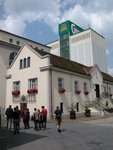
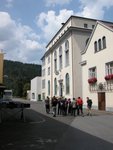
After years drinking copious quantities of their beer, CUCC members visited the Gösser Brauerei at Göss (just outside Leoben) for what is believed to be the first time on 26th July 2004. Excellent hospitality was received. Here are some pictures from the brewery tour; click the pictures for larger versions (640x480).
The brewery produces 40,000 crates of Gösser per day, but is remarkably quiet and spotlessly clean. Brewing occurs 24 hours a day in three 8-hour shifts, for five days a week. The left-hand picture shows the entrance, whilst in the centre picture we see the large tower holding the malt silos. The final picture shows the mash house, with the entrance below the clock.
 |
 |
 |
In the mash house, the malt is ground to grist on an upper level and then mixed with hot brewing liquor (known as water to the layman) from the local spring in the mash tuns. Here it remains for two and a half hours, before it is transferred to the lauter tuns where the liquid part, known as wort, is extracted. After this, the wort is boiled for an hour with hops in the brew kettles. Then, it is passed through a whirlpool to separate solid matter.
As far as we could tell, no additives such as sugars are used in the brewing process. This is pleasing, especially for a brewery of its size.
These pictures show mash and lauter tuns (not sure which ones are which) together with the computerised control system. In the centre photo we see the tubes through which hops are transported from the upper level into the brewing kettles (not seen in the photographs).
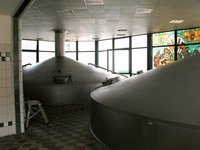 |
 |
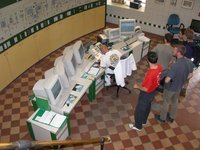 |
The picture below shows an elderly copper mash tun, now unused in favour of stainless vessels.
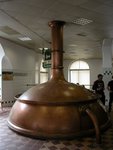
After whirlpooling, the wort is crash-cooled via a heat exchanger which in turn provides hot water (sorry, liquor) for the rest of the process. Then it is mixed with yeast and transferred into conical fermentation tanks, seen in the photo on the left below. After fermentation, the beer is filtered in the equipment shown in the remaining two photos.
 |
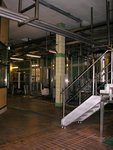 |
 |
In addition to filling nitro-kegs, Gösser bottle not only their own beer but also that of other breweries. When we visited, Puntigamer was being bottled as seen in the photos below. The right-hand photo shows the machine which puts bottles into crates. You can also see a movie (10Mb).
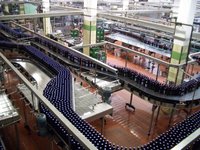 |
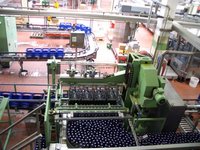 |
Some other photos from around the brewery: on the left, a system of pipework which seemed to be used for receiving or dispatching beer to tankers; in the centre, some storage tanks; and on the right, an old lager cask.
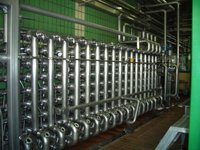 |
 |
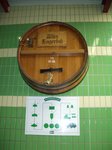 |
The brewery museum contains various interesting old equipment and even some adverts featuring the KH bunny!
 |
 |
We came away with the impression of the brewery being particularly efficient: the solid matter remaining from the mashing and boiling is burnt (providing 25% of the energy for the plant) and the carbon dioxide from fermentation is harnessed for use in bottling.
One last picture of all the CUCC folk who went:
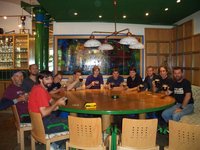
Many thanks must go to Dipl. Ing. Andreas Werner, the Gösser Braumeister, together with Frau Schneeweis and our tour guide for the sponsorship and an excellent day out.